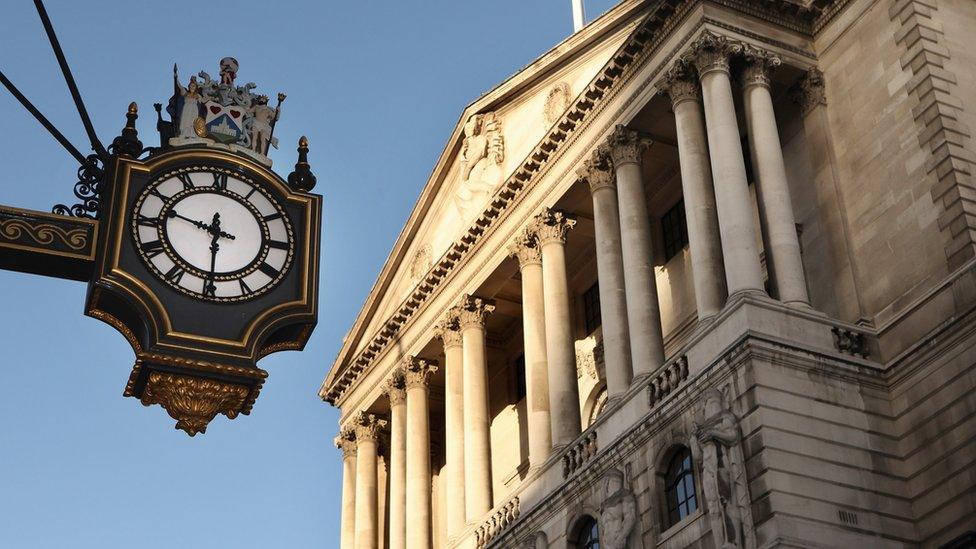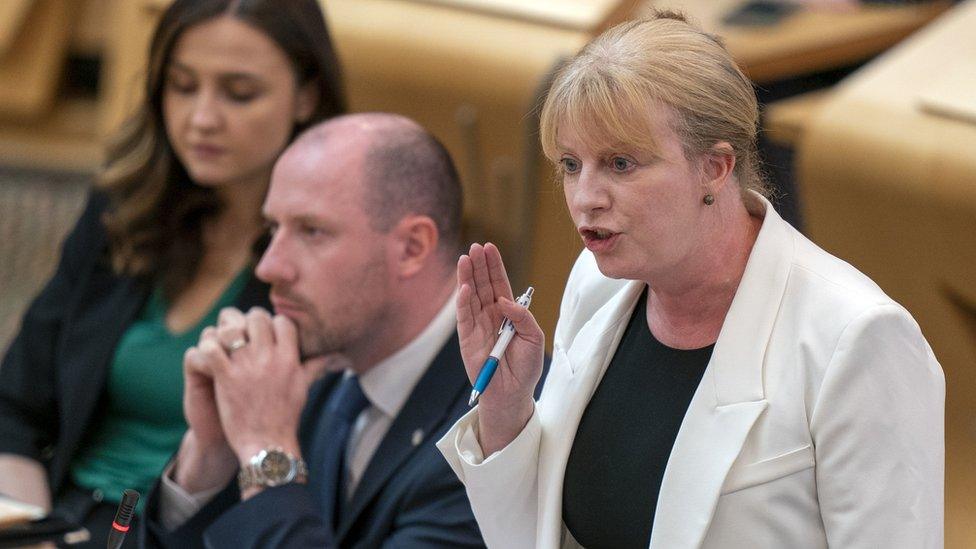The Scottish economy: 'Poor but improving'
- Published

The legal minimum wage is about to rise
This could be a year for economic recovery, but for now, the evidence about the Scottish economy points more to uncertainty, fuelled by business concerns about recruitment, "extreme cost pressures" and price hikes.
Business surveys reflect continued worries that governments are not helping firms or the economy grow, with the minimum wage and Scottish income tax going up next week.
The Fraser of Allander Institute is sticking to its forecast of anaemic growth this year.
Is the economy "turning the corner"? Conservative MPs hope so. It's the only pathway for turning round the daunting polling lead for Labour in an election year.
As we end the first quarter of 2024, what's the evidence? In Scotland, where evidence tends towards scarcity, we have more than usual.
Thursday brings publication of an important survey of members of Scottish Chambers of Commerce, all of them employing under 250 people, and at the same time, the quarterly assessment of the Fraser of Allander Institute.
Having cornered much of the market in business surveys, it is that Strathclyde University institute which is behind both publications.
Wage pressures
Asked between mid-February and 11 March, members of the Chambers of Commerce are facing "extreme cost pressures", says their president, Stephen Leckie.
This is partly due to the challenge of recruiting people, with nearly half of respondents facing problems, up from the end of last year.
The battle for scarce skills means wages are pushed up. Scottish wage inflation is faster than the rest of the UK, much of that explained by more generous public sector pay deals.
And the legal minimum wage is about to rise. From Monday, it's going up from £10.42 per hour to £11.44, and the minimum age to qualify for that is coming down from 23 to 21.
For those aged 23 and above, that's a welcome 10% increase in pay, and 12% for those in their early 20s. Lower minimum pay rates for under-21s and apprentices are up more steeply.
But the headline rate remains 56p per hour below the Real Living Wage, at £12, independently calculated to provide a basic standard of living to full-time workers.
For employees with price-sensitive custom and lots of younger staff on, or near, minimum wage - notably hospitality and retail - this is less welcome.
Payroll is the main cost pressure bosses are facing. More than three-quarters in the Chambers survey say so, while three in five say energy costs continue to be a major input concern.
Price inflation falling
For some, their concerns are worsened by the sharply tightened criteria for recruiting abroad. The minimum salary is going up, to a level far above the Scottish average wage.
To quote the UK government's fact sheet, it is "increasing the earning threshold for overseas workers by nearly 50% from its current position of £26,200 to £38,700 from 4 April 2024, encouraging businesses to look to British talent first and invest in their workforce, helping us to deter employers from over-relying on migration".

The Bank of England is holding off on an interest rate cut
Over half of firms reported investment is frozen, and that's the way they expect it to remain during the second quarter of 2024, while economic uncertainty remains.
Consumer price inflation has eased considerably - at 3.4% and soon to decline further as household energy bills fall from next week, it's the figure cited by those Tories looking for green shoots of recovery.
But of the Scottish firms surveyed, half say they expect to put prices up, and that's a sharp increase on price expectations at the end of last year.
That is one reason economists at the Bank of England is holding off on an interest rate cut, until it can be more confident that wage and price inflation rates are under control.
High-earners wanted
Earlier this week, a different view from the boardroom was published by the Institute of Directors in Scotland.
They were sizing up artificial intelligence, cyber-security and the transition to net zero as costs for some and market opportunities for others.
They claim to see opportunities for their businesses in improved work contracts, inclusivity and diversity. But their concerns are focused on the problems of government getting the economic fundamentals right, says Catherine McWilliam.
She highlights problems with workforce skills and implementation of government policy and a lack of economic priority or business collaboration coming from Holyrood.
Among their main concerns (82% of those responding) is the impact of another income tax bracket being introduced in Scotland next week, raising the tax bill for earnings above £75,000 to 45%, even if National Insurance is about to go down by 2p in the pound.
Those earners can't expect much sympathy, but company directors say these are the people they need to recruit into Scotland, and the divergence in tax regimes is not helping. Nor does it impress potential inward investors, say more than quarter of them.
Better off?
A further bit of data helps fill out the picture, issued by the Scottish government on Wednesday - its first estimate of growth across the Scottish economy during January. After a contraction of 0.6% across the preceding quarter, output rose in the first month of this year by the same amount.
December had also seen such an increase, indicating that the trend may, indeed, be turning a corner back to growth and away from a long period of stagnation.
So what do they think at the Fraser of Allander Institute? Its forecast for this year, of 0.6% over the whole of 2024, has not changed since the last quarter. It sees that rising to 1.1% next year and 1.2% the year after, still below long-term trend.

The Institute's commentary on the economy acknowledges falling inflation as a positive, moreso if it feeds through to lower borrowing costs. But it comes with a lot of uncertainty about other factors in the economy.
There's a fear that the improving outlook could be clouded once more by factors controlled beyond Scotland, including wars, energy prices and supply disruption.
That feeds into an indicator that the Scottish government monitors of consumer confidence. It's improved, from a negative outlook while inflation was high, both the outlook for the Scottish economy and for people's household finances.
Expectations of household finances have risen to the point where they are finely balanced: as many people are positive as feel negatively.
That could be a vital trend to watch for those fighting the Westminster election. The Allander report has the headline "Poor but Improving".
The big question - one of them, at least - is "do you feel better off?", and whether people's consumer and political choices reflect the perception that they feel they've got poorer, or even if they have, that things might be improving?
- Published21 March 2024

- Published20 March 2024

- Published15 December 2023

- Published2 October 2023

